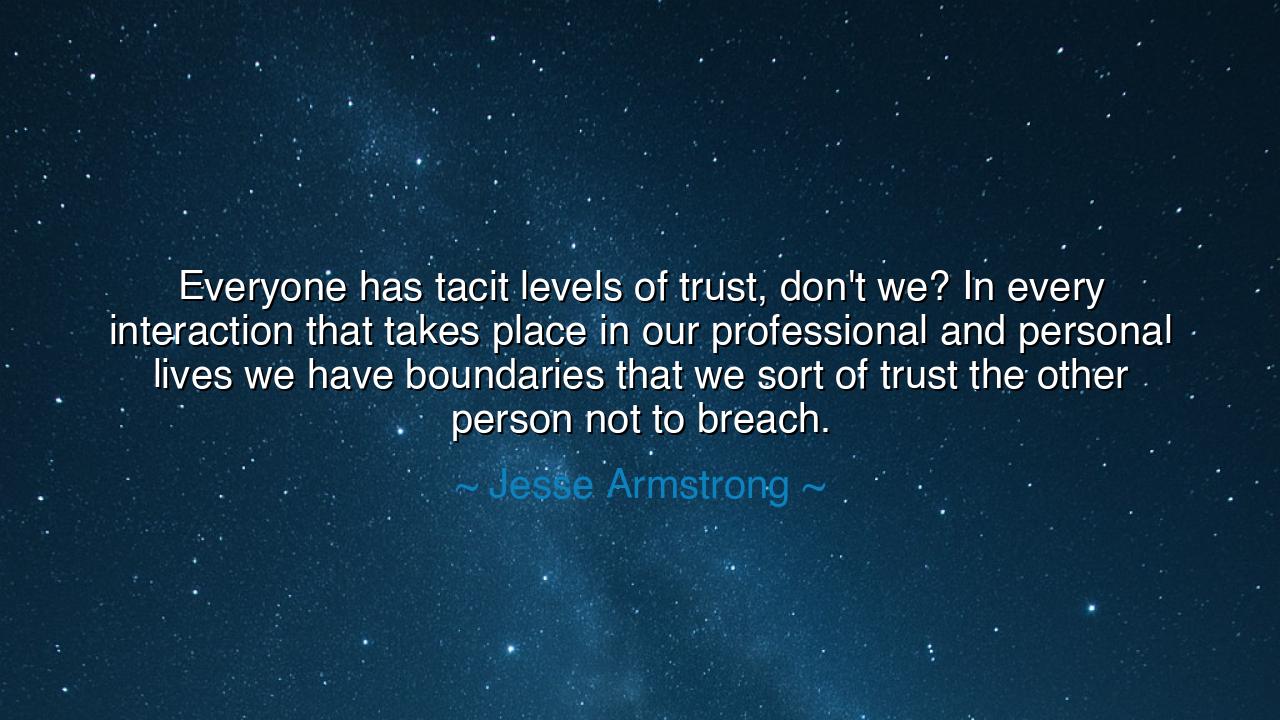
Everyone has tacit levels of trust, don't we? In every
Everyone has tacit levels of trust, don't we? In every interaction that takes place in our professional and personal lives we have boundaries that we sort of trust the other person not to breach.






In the words of Jesse Armstrong, creator and storyteller, there is revealed a truth both subtle and profound: “Everyone has tacit levels of trust, don’t we? In every interaction that takes place in our professional and personal lives we have boundaries that we sort of trust the other person not to breach.” These words may seem ordinary, yet they touch upon the very fabric that binds human beings together. Without trust, no society, no family, no friendship, nor even the smallest conversation could endure.
The ancients knew this truth well. They wrote of covenants, pacts, and oaths, but beneath all the ceremonies lay the same invisible thread: the unspoken boundary. To sit at a table and share bread is to trust that one will not be poisoned. To speak one’s mind is to trust the other will not wield those words as a weapon. Armstrong’s reflection reminds us that every interaction rests on unseen agreements, fragile yet essential, woven not in law but in custom, courtesy, and conscience.
These tacit levels of trust are the hidden foundations of all relationships. They are rarely declared aloud, yet all feel their presence. A teacher trusts the student to listen; the student trusts the teacher not to deceive. Lovers trust each other not to betray. Colleagues trust each other not to undermine. When these silent compacts are honored, harmony reigns; when they are broken, bitterness spreads swiftly, as cracks through marble.
Consider the story of Julius Caesar and Brutus. Their bond was that of mentor and protégé, of general and ally. Yet when Brutus struck with his dagger in the Senate, it was not the blade alone that felled Caesar, but the breach of trust. For Caesar could endure the attacks of many foes, but not the treachery of one he had trusted with his heart. Thus the phrase “Et tu, Brute?” resounds through history, a cry not only of pain, but of astonishment—that the sacred boundary of loyalty had been shattered. This tale reveals how devastating the breach of tacit trust can be.
Yet Armstrong’s words are not only a warning; they are a call to awareness. If trust is the hidden soil from which peace and cooperation grow, then each of us must tend it carefully. We must know the boundaries of others, respect them, and honor them even when unspoken. To breach these limits—through betrayal, gossip, exploitation, or deceit—is to corrode the very essence of human fellowship. To keep them is to cultivate safety, dignity, and lasting bonds.
The lesson is clear: be mindful of the boundaries of trust in all your dealings. In your home, honor the confidences of those you love. In your work, respect the integrity of those who labor beside you. In your friendships, carry the secrets of others as though they were your own. Let your word be strong, and your loyalty unshakable, so that others may walk beside you without fear.
And so I say to you, children of the future: guard trust as you would guard fire, for it warms when tended, but burns when mishandled. Speak truthfully, act faithfully, and respect the unseen boundaries that hold the world together. For when trust is kept, society flourishes; when trust is broken, kingdoms collapse. Remember always that the strength of your bonds lies not in what is spoken, but in what is silently honored. Thus shall you live as one who inspires confidence, and your name will be remembered not for betrayal, but for steadfastness.






1K15-Ly Khong-9A
Armstrong’s perspective on tacit trust speaks to how naturally we build boundaries in relationships, but what happens when those boundaries are tested? Are we always aware when our trust is being stretched or challenged? How do we communicate when those boundaries are breached, especially if it was unintentional? In both personal and professional settings, how can we create better awareness of these implicit expectations?
VAHoang Viet Anh
I find it intriguing that Armstrong mentions tacit trust, but how can we be sure that others recognize or respect these invisible boundaries? How many times have we experienced moments where someone unknowingly crossed a line simply because their understanding of trust was different from ours? Is it fair to expect others to know and honor these unwritten rules, or is there a need to make them more explicit?
UGUser Google
This quote brings up an interesting point about trust, but I can’t help but think about how often these tacit boundaries are violated. In both professional and personal settings, people sometimes step over lines they didn’t even know existed. How do we address violations of trust that were never explicitly communicated? Can we rely on this kind of implicit trust, or is it too easily misinterpreted?
DPle doan phat
I agree with Armstrong’s idea of tacit trust, but I also wonder if people’s boundaries are really as universal as he suggests. In different cultures or situations, people’s understanding of trust can vary widely. Can these invisible lines of trust ever be truly universal, or is the concept more individual than we think? How do we navigate trust when we don’t even realize the boundaries we’re working with?
QAdinh ba quoc anh
Jesse Armstrong’s quote really got me thinking about trust in relationships. It’s true that we all have these unspoken boundaries, but how much of this tacit trust is shaped by past experiences or cultural norms? Can we ever fully trust someone if we haven’t set clear expectations from the start? How do these invisible boundaries affect our ability to work together or form deep personal connections?